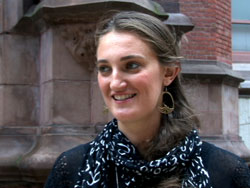Filed Under > Convocation
Rachel Heavner (M.A., International Educational Development - Bilingual/Bicultural Education)
Rachel Heavner (M.A., International Educational Development - Bilingual/Bicultural Education)
Rachel Heavner became a global citizen at age five, when she entered a bilingual French/English school in Berkeley, California. After graduating from Skidmore College with a bachelor’s degree in international studies and French, Heavner accompanied her brother and her father, who had been a Peace Corps volunteer in Sierra Leone during the Vietnam War, to Africa, to help rebuild schools in post-revolutionary Tanzania.
A few years later, she returned to Tanzania to teach English, French and computers to college students preparing to become teachers. “Living and teaching there was what got me interested in bilingual education in developing countries and the barriers students face,” Heavner says.
Why TC
While researching graduate programs in international education, Heavner found Lesley Bartlett, Associate Professor of Education in TC’s International and Transcultural Studies Department, who studies educational development in Tanzania. “I wrote to her and said I was really interested in the research she’s doing and wanted to come learn from her,” Heavner says.
TC Takeaway
For her final master’s project, Heavner did a comparative study of bilingual education in Paraguay and Tanzania. Paraguay’s bilingual system is considered by many to be successful at incorporating native languages into the largely Spanish curricula. In Tanzania, children also speak an indigenous, tribal language from birth, but from the time they enter school at age five or six, they are taught only in Swahili, the country’s official language. Only children who also learn English—and instruction is not widely available in Tanzania—can go to secondary school.
What’s Next
Heavner is headed back to the Bay Area to look for a job in educational program development with an international development organization. Long-term, she hopes to consult with philanthropic organizations on investing in educational programs in the developing world.
Heavner says that while bilingual classes enhanced her already rich education, they could be life-changing for millions in the developing world.
“Education is political; education is cultural,” she asserts. It has the power to “create change and peace, in a lot of ways. How much conflict is created by misunderstanding, and how much of that misunderstanding could be dealt with by learning about other cultures?”
Published Tuesday, Jun. 24, 2014
